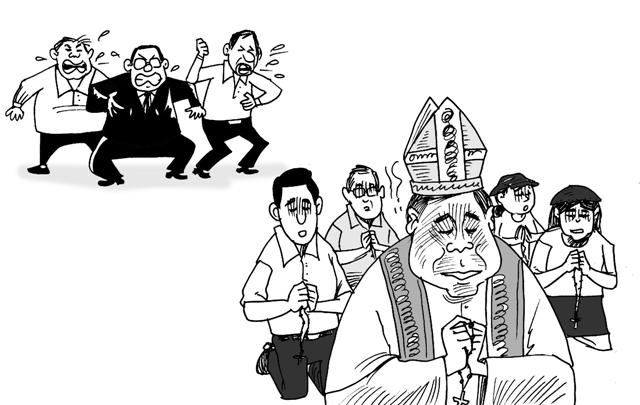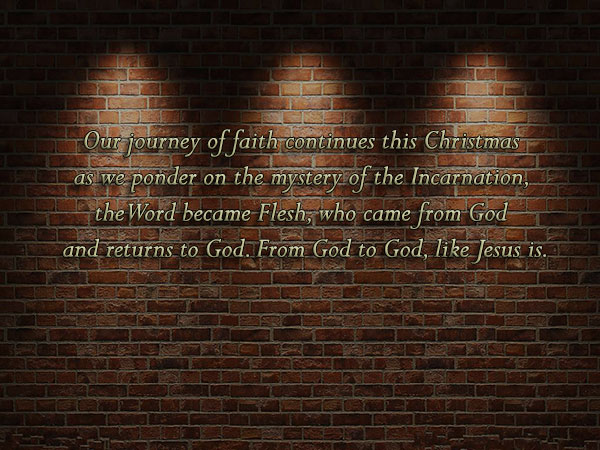(CBCP News) THE commonly invoked “Separation of Church and State” especially so when certain politicians pitifully think politics is not covered by ethical principles, believe that politics is beyond the reach of moral norms. Conclusion: What they think, say and do are always right. Woe to those who dare tell them what is good or evil, what is devious or virtuous.

Separation of Church and State
It is wherefore quite interesting to take note of the Church and State relations in the Philippines—particularly on how politicians react against certain Churchmen when these speak about the well-known shenanigans of many political figures in government. The usual drama goes this way: certain Bishops and Priests preach and react when these or those politicians fondly abuse their power, happily reward their friends and/or greedily accumulate dynastic wealth. The politicians who feel alluded to, invoke the mantra of “Separation of Church and State” which in substance means: Churchmen shut up!
It might be good to state for the record, that not only the State but also the Church have their respective provisions on their rightful and proper normative separation. For the State, it says that there would be no official State Religion. For the Church, it provides that no Cleric may accept, much less seek any public office in government with the exercise of civil power.
So it is that by force of but the 10 Commandments—among which are “Do not kill.” “Do not commit adultery.” “Do not steal.”—not to mention the pursuant Social Doctrine of the Church—Churchmen have both the right and all the obligation to speak and to act when the government as a whole or when certain government officials indulge in greed through graft and corrupt practices—considering that even the highest government official as well as the Supreme Head of the Universal Church are definitely not exempted from the iniquity of stealing, killing, and many other criminal offenses as provided by just and proper legislations. So it is that even the Church has her own Penal Law among its canonical legislations applicable to erring Churchmen in the natural and/or the spiritual order.
No wonder then that the Catholic Bishops Conference of the Philippines (CBCP) formally issued no less than three major full-length official Pastoral Exhortations. More concretely, there was the “Pastoral Exhortation on Philippine Politics” (1997). This was followed by the “Pastoral Exhortation on Philippine Economy” (1998) and topped by the “Pastoral Exhortation on Philippine Culture” (1999). All these official CBCP documents have their doctrinal basis on the Sacred Scriptures as well as the pursuant Social Doctrine of the Church as applied to the concrete political, economic and cultural realities long since obtaining in this country, past and present.
There is nothing like being acquainted with her Social Doctrine to know that the Church is not only preoccupied with the truths about heaven but also concerned with the realities here on earth. The Cross of Christ is well-represented when the Church speaks the truths about God and man and the truths about man and man.
Today’s cry in the desert
LIKE St. John the Baptist whose call for repentance aspreparation for the coming of the Redeemer was a lonely cry in thedesert, the voice of God today as well as that of the Church or of anyspiritual and moral Christian teaching is becoming a voice of onecrying in the wilderness.
Present circumstances in the world point to a growingdeafness and insensibility to truths of faith and morals. The prologueof St. John’s gospel already captures this phenomenon: “He came untohis own, and his own received him not.” (1,11)
There is secularization, a deadly process of removingGod from society and in people´s daily lives and affairs. But this, it seems, is not so much because of non-believers but rather of thosewho say they believe and yet behave as if they are not believers.
There are many cases of infidelities and disloyalties,disobedience and treachery within the Church. The worst enemies arenot to be found outside the Church but inside, not those far from theChurch but those supposedly near, not those who declare themselvesnemeses but those who say they are friends and allies.
There is a tendency to politicize even sacred things,like the nature of marriage, or the Church itself, the sacraments, thedoctrinal body of faith and morals, and even Christ himself. Some havedivided Christ into a Christ of history and a Christ of faith, for instance.
There are inconsistencies and gaping gaps in the lives ofmany so-called believers, especially those in public office.Pretensions and hypocrisies abound, and while to a certain degreethese are understandable given our fragile human condition, in manycases hardly anything is done to correct them.
Some so-called Christians even go against Christ´steaching in their public functions. Their idea of governance barelygoes beyond bureaucratic efficiency. Again it´s empty of its basicrequirement of vital contact with God. It´s purely human, stuck withthe criteria of practicality, convenience and the like, and nothingabout fostering sanctity.
How does the Church address this widespread scenario? The Second Vatican Council in the 60′s was the best initiative; and so was the Second Plenary Council of the Philippines two decades ago. Pope Francis is on this, too. But for sure the cry in the desert will have its fruits in God’s time.
Post Credit: CBCP News











